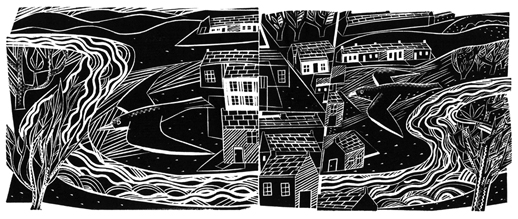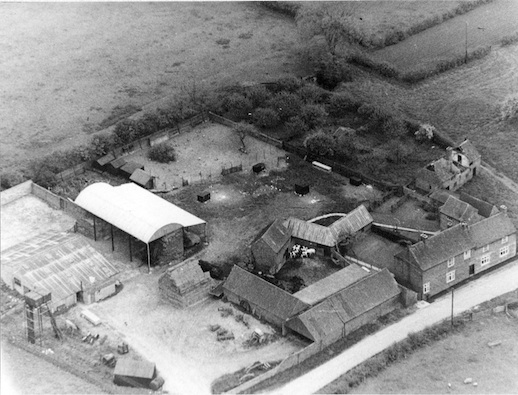
Illustration by Jonathan Gibbs
Words by Neil Sentance
1995: North End, part 1
In the dairy an ancient bulb was hanging from a thin braided cord, rimed in straw dust and casting a buttery half-light. I walked through the main atrium, behind the feed stalls and into an anteroom, remembering how as a small child I’d seek out my grandfather in here as he checked his account books, his eyes grave, his face set hard. The stores in those days were stacked high with bags of cow cake and fertiliser, each as solid as a man; metal pails brimming over with chicken feed; galvanised iron ten-gallon milk churns; giant cans of Swarfega and tubs of creosote. Today the smell was the same – flue gases and turned milk and antique raked-up muck. But now that windowless room was mainly empty. Accretions of cold dust were finely layered over some rickety spindle-backed chairs as if blown in on the wind. Old corn ears littered the concrete floor. A rusty tobacco tin, where grandad had kept his strapless wristwatch, poked out from the pocket of some worn-out overalls, which hung on a nail next to a curling 1980s feedstock company calendar annotated in biro capitals. Fantastical cobwebs looped in the high corners, tensed by the husks of dead flies. As I stood there in the draughty doorway the bulb fizzed and sputtered out and the other lights in the dairy cut out too – they were wired in series like Christmas illuminations. A shaft of grey daylight laddered down from a gap in the roof and I made my way through the empty corridors and outside again.
The notices had appeared in the Journal and the Advertiser. After seventy years North End farm was up for sale. The machinery plant and tools had been sold off the year before, some still operational and now seeing service on other local farms, others outmoded and destined to adorn gastropubs, providing some faux rustic colour above new inglenook fireplaces. Ancient pantiles from an old barn had been bought by an American dealer and were now roofing a granary restaurant in rural Illinois. The tarnished and blunted blades of a plough could still be seen amongst some rank fireweed, like the scapulas of a once sleek earth-moving creature. The stackyard, the last in the village on the lane to the river, was stilled. Rainwater lay in stagnant puddles on the uneven ground. Tall spindles of grass and some wanton wheat sprouted in shadeless corners, as close-packed as a cornfield.
My grandparents were readying themselves for the last auction, to bear witness to their lives going up for sale. My grandfather Ted was in his seventies and bent with arthritis. The farmwork was now a tough daily grind that he would have endured till he could no longer stand, but he felt the old country attributes of hard work and patience were no longer enough in an era of paper mountains, aggressive marketing and diminishing returns. My grandmother Mary though was full of memories, and more sentimental about leaving the farmstead: it had been a life of hard graft and thrift, but she’d give her cheerful bosomy shrug and produce one of her gnomic sayings: ‘we’re not short of what we’ve got’. She hated to see the place decay, to look, as she said, like ‘The Wreck of the Hesperus’. For her, the farm still echoed with the clatter of children: her five daughters, now grown and married, the two lost infant sons, and the hordes of grandchildren. She had been in her element during the big family gatherings, the Sunday teas, served through the hatch to the farmhouse dining room, overlooked by the ascending line of wedding photographs. Plates were arrayed over the table on a white tablecloth: ham and cold cuts of beef, pickled onions and English cheeses, salad tomatoes, radishes, beetroots, spring onions with salt. Everyone had thick slabs of white bread and butter, cups of tea all round. The smallest cousins sat on poufs at the coffee table, ignoring the babble of the grownups at the big table. For pudding were cakes and trifles, wondrous confections – even with full stomachs most of us had a little of everything. Afterward some of the older ones walked to the ford, or talked by the farm gate. Most lolled on sofas. Grandad would have his hair cut in the kitchen, the washing up piling up around him. And then it was time for home, effusive kisses, bear hugs, and time for a catnap in the back of car going down the night-time A1. My grandmother would miss all this the most.
I had come back to the farm to make a self-conscious final tour of my childhood imaginarium, a micro-landscape I knew so well, ghosts behind every barn door. I turned right out of the dairy and went over to the water tower, a lofty grey structure topped with black bowsers for irrigating the arable fields and cattle troughs. Under the tower, amongst the nest of iron supports, was the kennel where a succession of farm dogs had lived, never allowed in the farmhouse and not kept as pets. I feared them as a small boy, their exuberant jumpiness when released from their captivity or the look of frustration in their mustelid eyes when tethered, their hot slavering mouths full of long yellow teeth. To escape their attentions I would stand on the stone blocks where the milk churns were placed ready for the delivery van, waiting for the kennel door to latch again.
I climbed a few rungs of the water tower ladder. From here I could see the small coterie of young trees leaning into each other next to the wooden fence, including the horse chestnut I’d planted when I was five, and that had now outgrown me three to one. Beyond was the homefield, the farmyard’s yawning hinterland, and the edge of the slurry pond dug out singlehandedly by grandad long ago. The homefield was broad and flat, short-cropped and sheltered from the wind by old hedgerows – it could have served as an aerodrome in a county of so many. In fact, it was here that Uncle Ian, after spending weeks assembling, painting, oiling and balancing, had presented the maiden flight of a remote-controlled model airplane. All the grownups and grandchildren had gathered by the pond, the mood festive, the day bright; calibrations and calculations and last-minute checks heightened the expectation. Finally, a lever was pulled, a button pushed, a connection made. The plane revved into life, tracked across the pasture and lifted off the ground in a petrol-fumy jolt. The glory of a successful launch: cheers rang out from the young ones. And then the plane seemed suddenly to pick up speed, as if in a fit of pique. Uncle Ian grappled with the controls, his roll-up wilting at the side of his mouth. The plane flew off over the rooftops towards the river, a rogue drone, never to be seen again…
Grandad had been working down at the riverfield and had missed the air show, but caught a glimpse of the model plane’s serene progress over Lincoln Hill. Perhaps as he dug out a ditch with the heavy iron shovel, his mind’s eye made a jump-cut. In 1941, as he worked in the homefield, he had watched a fleet of German bombers, Heinkels, fly over towards the town ten miles away. He heard later there had been a raid on the munitions factory. Joyce, a girl he had been courting over the last year, had just come off the dayshift. She was one of forty-one killed. He never talked about it thereafter.
At the homefield edge ran the beck, and alongside was a favourite nook, a hollow by a sycamore tree, an ideal den. I spent idle days here under big skies, reading books not on the school list: Chandler and Kerouac, Laurie Lee and Alain Fournier. Or else there’d be hours of languid talk with cousins and brothers, or of woolgathering with my back against the tree, eyeing the spiders climbing to the tip of the grasses and then waiting for a gust to launch into the wind. I was replete with the time all ahead of me and mostly oblivious of the greater world beyond. But even here in this sequestered spot the crank of history was turning and it wasn’t long before national politics began to burn into my hazy consciousness. During the 1984 strike, three miners down from the Nottinghamshire pits were caught poaching by the beck. The colliers had been seized by the police on an autumn night as the strike bit hard, hunched in black overcoats, out for a pheasant or rabbit, slim pickings in their night-time wanderings. My grandfather, a true-blue Tory his whole life, surprised me with his sympathy – Sunday teatimes always ended in debates about the state of the world and he knew I was forming the leftward convictions I’ve held ever since. He pressed no charges against the miners, although there were others that did.
A few years on, I squandered exquisite woeful hours here yearning over the girl from a neighbouring farm I’d met while potato-picking one winter. She wore snug-fit jeans, had a short bob of curly russet hair and had an exotic air of knowingness, of Romany independence. I’d seen her once walking the footpaths of the Viking Way that ran down here towards the river at Marston Hall, and I always hoped to see her here again. I never did. At last, a couple of years later I saw her at a teenage party. She was sat on the stairs weeping and I, still too shy to talk to her, could only walk outside and feel sorry for both of us…
Scenes from the Waterside archive.
